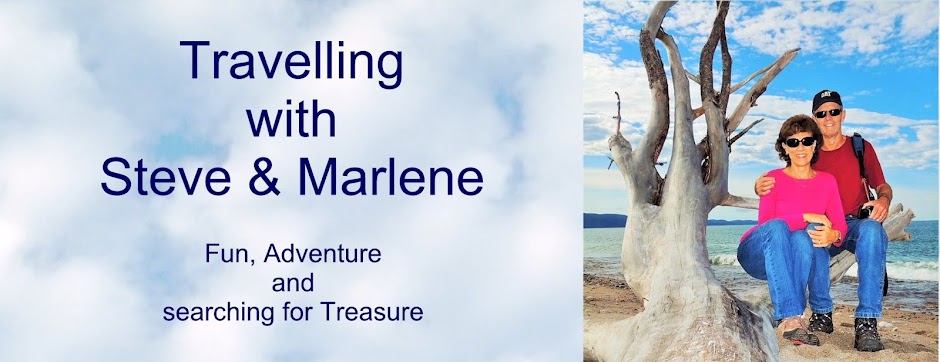Marlene, Penny and I are heading out to the Rock. For those
people who have never been to the Rock, we're talking about Newfoundland.
This story actually started a few years ago. Joe and I had
yet to be more than acquainted, when we ended up in
opposite ends of the same canoe. We had joined our mutual friend Mike and
another friend Bruce on a canoe trip in Algonquin Park. Joe was in the back of
the canoe and I was up front. From one day to the next, we seldom splashed each other, neither of us managed
to tip the canoe, and as I recall, every time I looked over my shoulder, Joe
was smiling. So, is the point of departure for this adventure to Newfoundland.
This past winter, Marlene and I learned that Joe and his
wife Cathy are relatively new owners and renovators of a vacation house. It's a
harbour-front house named the Friendly Fisherman in the little fishing village
of Rose Blanche, Newfoundland. Rose Blanche is on the barren southwest shores
of the Island, about a hour from Port aux Basque.
As the name Rose Blanche suggests, the outport was first
settled by the French. The French fishermen located there because the harbour
was sheltered from the wind and sea. But of course there was more, there was good
cod fishing on Rose Blanche Bank in the days when there was an abundance of cod.
The year was 1810.
Within rowing distance of home, the men would gig from
dories and return with their haul each day, or they would sail by schooner to places
further away and net fish until the boat was full, then get back home before
their tonnage spoiled.
The cod were cleaned and salted, then often the women would
lay them out to dry on wooden flakes in the sun. They were laid uniformly,
first with one side up, head to tail, head to tail, and then turned over with
the other side up. And, so they stayed until dried and shrivelled beyond recognition
of their original self.
Over time, longliners took the place of the dories and schooners;
a fish plant with a freezer took the place of salting and drying. Increasingly,
more fish were caught and sold, and times were prosperous.
But then, without adequate government regulation, large trawlers,
most foreign owned, with sonar, onboard freezers and bottom dragger nets raped
the Grand Banks. The cod stocks dropped
almost to extinction, and in 1992, a moratorium
stopped the cod fishing altogether. Many of the longliners were dry
docked, the foreign trawlers went away, and the fish plant closed. Eventually,
most of the fishermen of Rose Blanche like those in other outports retired ,and
many of the subsequent generation learned they had to move away to make a
living.
Today, Rose Blanche is quiet, still well known for its history,
and has a beautifully rugged coastline. And of course there's hope, hope for
the future with recent news of the northern cod stocks showing the first signs
of a long awaited and slow recovery.
In the meantime, we've got our rain slickers packed, a
reservation for the ferry, and a loose plan to use Rose Blanche as our base
while we take our trailer, Penny, on tour to other parts of the Island. We
expect to spend some time in Gros Morne
National Park, but more our style, we hope to visit a number of outports and meet
Newfoundlanders doing what Newfoundlanders do.
If we're lucky, some
drizzly morning, we'll get a chance to take to a dory for a row through the harbour
fog. I expect it's only then that we'll get the real feel for what it's like to
be a Newfoundlander.
As always, our
adventure wouldn't be the same without you, so please join us.
Click here for the next story in this series:
http://travellingwithsteveandmarlene.blogspot.ca/2017/05/the-death-of-maggie-our-guardian-angel.html
Click here for the next story in this series:
http://travellingwithsteveandmarlene.blogspot.ca/2017/05/the-death-of-maggie-our-guardian-angel.html
Research
Sources for this story include:
Encyclopedia
of Newfoundland and Labrador, volume 4, Rose Blanche - Harbour Le Cou
Cod by Mark
Kulansky
Wikipedia
Google
Images






